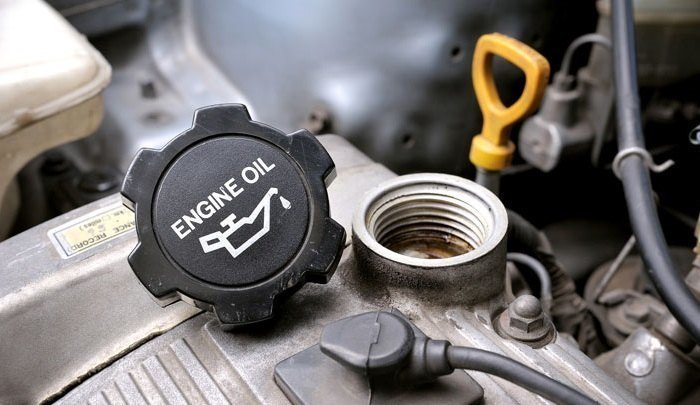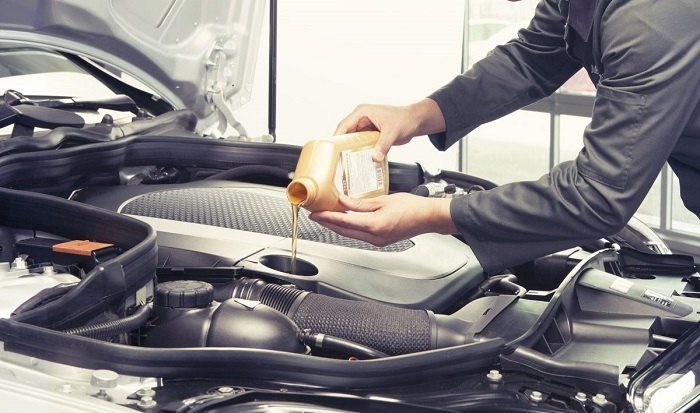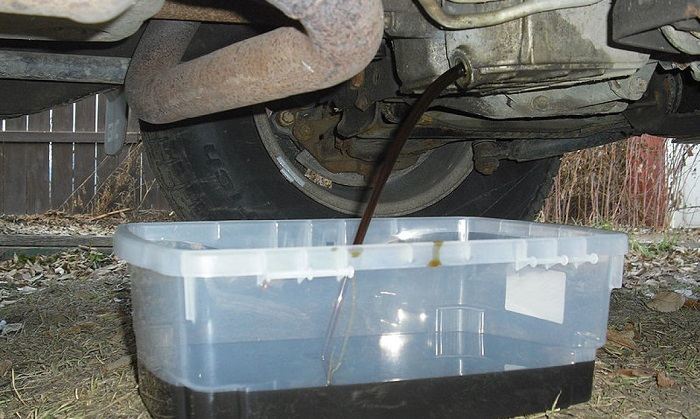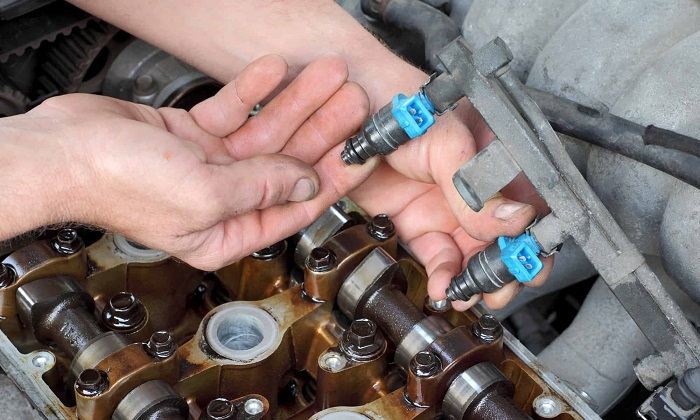by Joshua Thomas
Gas and oil are two of the most important fluids in your vehicle, but with modern engines, each has a separate function, and so they should not mix when doing their respective jobs.
But, in some instances, you might find your oil with a strong gas smell, which is an indication that some gas found its way to the oil and hence causing dilution. While the vehicle will still move and perform fairly well, this is a sign that there is an issue that needs to be fixed.
Despite smelling gas in your oil when changing it being quite common, it is not something that you should live with. And to deal with the problem you will first need to understand the causes. Here we explain the main causes and also the consequences and ways to prevent it.
Contents

There are different situations and things that can lead to your oil smelling like gas, and they will range from your driving habits to faulty engine components like fuel injectors. But here are the most common causes of oil smelling like gas.
There is nothing wrong with short drives, but if they make up a bulk of your frequent drives, this can be one reason you end up with your oil smelling like gas.
Because gas is always ending up in the oil pan, driving for short distances does not allow it to get vaporized as the engine temperatures will not get high enough.
If you drive for short distances and your engine does not get hot enough to heat the oil to vaporize the gas, you should change your oil in shorter intervals to avoid the gas smell in the oil.
One of the main reasons you end up with gas in your oil is using a fuel mixture that is too rich. If the mixture is too rich, your combustion chamber finds it had to ignite all the fuel, which then causes the extra fuel to run down into the oil pan through the piston rings.
Fuel mixture is the ratio of gas to air, and in an ideal situation, it should be around 15:1 to ensure efficient combustion. Anything besides this can mean that all the fuel will not be burnt.
Different things can lead to an excessively rich fuel mixture, but the key ones are damaged MAP sensor, mass airflow sensor, and oxygen sensor.
Fuel injectors are a crucial component for most modern vehicles as they help to ensure the engine gets just the right amount of fuel.
The fuel injector works with a solenoid to ensure the job gets done, and it is controlled by the car's computer, which is what calculates the precise fuel to be injected into the engine.
If the fuel injector is faulty, you can end up with gas in your oil pan. This happens because there will be extra fuel which then ends up leaking into the oil pan and gives the oil the gas-like smell.
Piston rings are another crucial component when it comes to managing fuel and how it is combusted in the vehicle's engine.
If you have faulty or damaged piston rings, it will be possible for a substantial amount of gas to leak into the oil pan.
Luckily the piston rings do not get damaged easily, and you can also do a simple compression test to determine whether they are the source of the problem or not. But, when the piston rings get damaged, they are quite hard to repair, and so you will need the services of a mechanic.
An engine misfire can be a result of a wide variety of problems from a faulty IAC valve to a bad fuel injector. But when the misfire happens, it can also lead to gas ending up in the oil pan.
When there is a misfire, it means the air and gas mixture is not being ignited correctly, and so the combustion cycle will be affected.
The unburnt fuel mixture ends up in the oil pan by flowing down through the piston rings, and if the latter is also faulty, then the situation worsens.
As rare and unbelievable as it might sound, it is actually possible to add gas instead of oil, and many inexperienced motorists can easily make this mistake.
In many instances, it will happen for individuals that tend to use canisters to fill up their fuel tanks. Most will use almost any empty container available in the vehicle and an oil bottle is not out of the picture.
Hence, it is easy to confuse what you have in the oil container and end up adding gas in the oil filler cap instead of oil.
7. Faulty Carburetor
Carburetors might seem like an outdated technology since most modern vehicles will not include one. However, if you have an older model, it will have one instead of a fuel injector.
Hence, if you have gas small in your oil, a faulty carburetor might be responsible for the problem. And this occurs when the carburetor gets damaged and allows the fuel to blend with the oil or extra fuel to flow down to the oil pan.

Like any other vehicle engine problem, when gas and oil are mixing in your car beyond the allowed parameter, there will be some signs and symptoms. Knowing these signs is vital as it will allow you to diagnose and resolve the problem in good time before it worsens.
You do not have to wait to open your oil port to get the strong gas smell because if you have gas in your oil, it can also be felt when driving. Hence, if you notice a strong gasoline odor when driving, you need to check whether you have gas in the wrong places.
The smoke coming from your tailpipe is always a reliable way to tell when you have a problem such as oil and gas mixture. When you notice that the smoke is opaque white, this means that there is an issue with the combustion, and in most instances, the fuel mixture will be too rich, which can lead to gas ending up in the oil pan.
Because the dipstick is immersed in oil, it should smell of oil when you remove it. Hence, when you find that it smells more of gas than oil, then the chances are you have some gas in the oil port. Also, if the oil falls a little too easily from the dipstick this is another symptom.
When gas finds its way to the oil pan, it will naturally increase the level. Consequently, when you notice that the level in your oil port is more than usual, then this coupled with other symptoms above is a good sign you have gas in your oil pan.

Because gas and oil are not meant to mix in your vehicle, when this happens, there will be some consequences, whether minor or more severe ones that can result in catastrophic problems. But, overall here are the most probable effects of the oil and gas mixture.
Lowered oil viscosity is one of the main consequences of the gas ending up in your oil pan. Gas is thinner than oil, and hence when the two mix, the viscosity of the oil is lowered significantly.
The lower viscosity affects the oil's lubrication capability, and this is more so when driving under extreme conditions. And so you will need to change the oil more frequently to ensure your vehicle is lubricated efficiently.
Another consequence of gas in your oil will be an increase in wear and tear for different metal engine parts.
Remember that efficient lubrication is what prevents excessive wear and tear, and so if the oil loses the capability to lubricate, you can expect parts to wear out faster as they will be grinding against each other more aggressively.
If your oil does not have the right viscosity due to dilution by gas, it will not only fail to lubricate the engine parts but will also not be able to cool it down effectively.
The change in viscosity means the oil does not flow as smoothly as it should, and hence you are likely to notice your engine overheating, which can then lead to other more serious engine issues.
Too much gas in your oil also means that your fuel economy will reduce and overtime the reduction can be quite significant.
The gas that ends up mixing into the oil will not get combusted and hence not supply any power to the car, which means there will be gas wasted, which is what lowers your fuel economy.

While in some instances there is hardly anything you can do to prevent gas from mixing with oil, like any other car problem, there are still a few things you can do to minimize the likelihood of the problem occurring.
Keeping a routine maintenance schedule is one of the best ways to ensure you never have to deal with this problem. If you maintain the vehicle often, you can easily spot any issue that can lead to gas smell in oil such as a faulty fuel injector.
Piston rings are the main vehicle component tasked with preventing oil from mixing with gas, but like any other vehicle parts, they wear out over time. And so changing them often enough can help prevent this issue.
If you are a city driver that is used to driving for short distances, it is a good idea to take a few occasional long drives. Long drives allow the engine to get to its maximum performance level and in the process, it can vaporize any gas in the oil pan.
In some instances, you cannot avoid using a canister to add fuel to your vehicle. But when you have to do it, you should get a proper gas container and not just use any that you come across such as old oil bottles. Also, make it a habit to rinse out any container you intend to use for oil or gas to ensure it will not have any residue of either.
While many motorists tend to assume some gas smell in the oil is usual, this is not entirely true as it is often an indication that oil and gas are mixing somewhere in the vehicle, and if the mixture goes beyond certain levels, it can be problematic for your vehicle.
Some of the main causes of this common issue are faulty piston rings and fuel injectors, frequent short drives and also unknowingly adding gas into the oil port.
But regardless of what causes it, you need to fix it as soon as possible to keep the vehicle running smoothly. Frequent oil change and replacing worn piston rings are some of the best fixes.
Sources
 |
 |
 |
 |

About Joshua Thomas
Joshua Thomas just simply loves cars and willing to work on them whenever there's chance... sometimes for free.
He started CarCareTotal back in 2017 from the advices of total strangers who witnessed his amazing skills in car repairs here and there.
His goal with this creation is to help car owners better learn how to maintain and repair their cars; as such, the site would cover alot of areas: troubleshooting, product recommendations, tips & tricks.
Joshua received Bachelor of Science in Mechanical Engineering at San Diego State University.